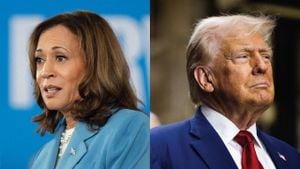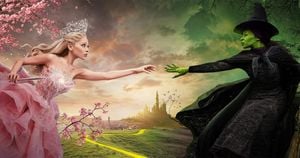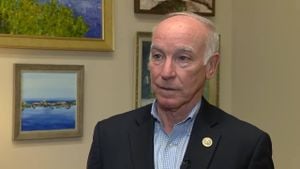The conflict over pay equity within the entertainment industry found new fuel recently, particularly around the beloved musical Wicked. This scandal erupted when social media whispers suggested Ariana Grande, the star playing Glinda, was compensated at least 15 times more than her co-star Cynthia Erivo, who portrays Elphaba, the Wicked Witch of the West. Speculations surfaced after a viral TikTok video claimed Grande was raking in around $15 million for her role, compared to Erivo’s reported $1 million payout.
This pronounced gap drew considerable attention online, highlighting the persistent issue of wage disparity not just among actors, but across all entertainment sectors. The conversation amplified on platforms like TikTok where users expressed outrage and disapproval, calling out industry practices.”
Yet, the makers of Wicked were quick to quell these financial fears with official statements describing the claims as “completely false.” They reassured the fans and media alike stating, “The women received equal pay for their work on Wicked.” This public acknowledgment was bolstered by sources close to the production, affirming both leading women were compensated equally for their significant roles.
This pay equity emphasis is fitting, especially considering the significant contributions both Grande and Erivo have made to the production. Grande, the pop sensation with millions of followers and numerous awards to her name, and Erivo, known for her powerful performances and vocal prowess, bring not only star power but also artistic gravitas, making equal pay seem both deserved and fair.
The uproar coincided with the recent release of the first part of Wicked, directed by Jon M. Chu, which finally hit theaters after much anticipation. It debuted to impressive box office numbers, collectively with contemporaneous releases like Gladiator II. Wicked accumulated over $270 million worldwide during its opening weekend, solidifying its position as not just another adaptation but potentially one of the biggest films of the year.
Considering the star-studded cast, which includes Michelle Yeoh, Jeff Goldblum, and Peter Dinklage alongside Grande and Erivo, the conversation surrounding their roles and compensation amplifies the broader discussion around how female leads are valued and portrayed within the film industry.
While the producers have addressed the pay disparity claims, it speaks to larger systematic issues of how salaries are negotiated especially for women and actors of color. The buzz around Grande and Erivo's compensation is yet another chapter in the lengthy saga of striving for equity. Pay gaps persist across industries, and the entertainment sector is no exception. Observers argue it’s not just about these two actresses but highlights the environment these actresses work within, shedding light on the need for more sustainable, equitable practices.
This isn't the first time gender-based pay disparities have received backlash. The entertainment sector has seen numerous instances where male co-stars earn significantly more than their female counterparts, sparking outrage and leading to calls for change.”
Grande's glittering fame is undeniable, but so is Erivo’s compelling talent, reminding many of the importance of recognizing contribution rather than simply leveraging personal brand when it’s time for negotiations. The backlash against pay inequality has encouraged discussions within Hollywood about fairness and transparency, creating more awareness among fans and potential future employers alike.
The relationship between pay equity and artistry remains fraught with complexity. While both women were said to be compensated equally for Wicked, the persistent speculation creates doubts among fans and advocates of gender parity. Questions linger: How often are women offered equal pay? What factors influence negotiations? Are Hollywood's practices truly moving toward more equitable solutions?
The release of Wicked is monumental, yet underlined with questions about representation and equity which fans are rightly concerned about. The heart of these discussions pushes for visibility, encouraging the industry to take actionable measures to achieve equity.
With production costs surging and discussions of creative budgets frequently coming to light, fans hope this incident will resonate beyond Wicked and initiate lasting changes within the industry. Recognizing the disproportionate earnings among stars not only has the potential to reshape Hollywood negotiations but could also influence public opinion, particularly as viewers become more socially conscious consumers.
Moving forward, the conversation doesn't end here. The discussions initiated by this pay gap saga could continue to unearth industry-wide pay discrepancies and lead to meaningful policy changes governing how actors are paid for their artistry.
While the Wicked creators have denied discrepancies, the issue doesn’t diminish the valid concerns surrounding gender and racial pay gaps across various sectors. Greater awareness and advocacy have always moved the needle, and the latest dialogue surrounding Grande and Erivo could be just the beginning of meaningful shifts within Hollywood and beyond.



